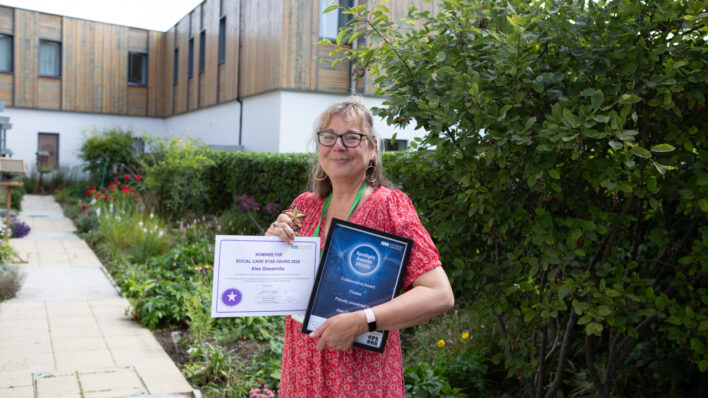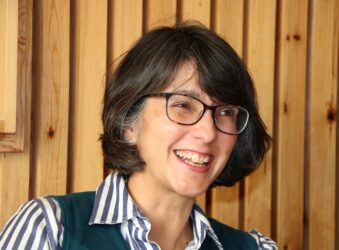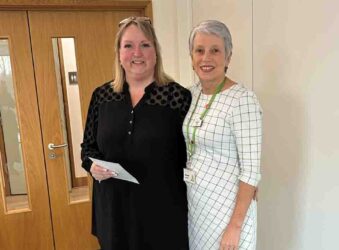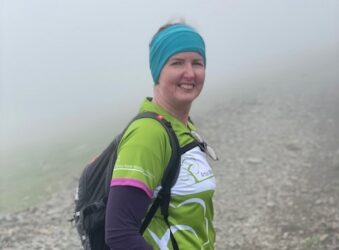Hospice and Cambridgeshire County Council collaborate
Share this story

Arthur Rank Hospice Charity have been collaborating with Cambridgeshire County Council (CCC) to provide palliative care information, training and support to Adult Social Workers.
By bringing health and social care together, with the objective of supporting unpaid carers, they have been able to support more people living with a life-limiting condition.
Alex Giasemidis, who is a Social Worker based at Arthur Rank Hospice and employed by both the Charity and Cambridgeshire County Council, explains more:
“Our approach goes right across grass roots level, where we are upskilling practitioners so that they have the confidence and the competency to talk about death and dying. The majority of our practitioners haven’t even thought about their own death and dying, let alone about having the competence to talk about that with unpaid carers or with service users.
One of the big issues for Social Workers is supporting a parent with children and there may not be anybody who has parental responsibility or guardianship. For a long time, we’ve had difficulties navigating children’s social services to make sure that when the patient dies, that there is a safety net in place to support the children.
A few years ago we ran a pilot training session at the Hospice. We identified topics like terminology, different services that are involved, pre-bereavement, post-bereavement etc. and presented it to a small group of social work practitioners, who fed back that this was really helpful. When there was the opportunity to access the funds, we sent out a questionnaire within adult social care and it was identified that there was a gap. So, we delivered four face-to-face training events. We knew it was a really emotive topic but what was really interesting, in the feedback, was that the majority of practitioners said that they actually felt very apprehensive and nervous about talking to service users about end of life care.
It’s been so interesting to be involved in this because we’ve discovered so much we didn’t know. Along with Carly Wills, Matron of Clinical Services and Kay Hardwick, Head of Education and Practice Development, at the Charity, we have been working to change cultures, as the two organisations can work very differently. Even things like terminology; at the Charity we say ‘patients’, at the County Council they refer to ‘service users’.
It’s really key in hospital discharge planning, so we know that there’s a window of opportunity that has been lost. The Social Care Institute of Excellence conducted a case study around the collaboration and we are putting together an education package that will sit within adult social care but will also be accessible to colleagues at the Charity. We’ve already had interest from other local authorities, from the integrated care board and out of county, so it’s really building momentum. We are tapping into, not only adult social care but practitioners working in the homeless community, supporting care homes and residential nursing homes.
We plan to develop this further with Children’s social services too as it’s acknowledging that death and dying is everybody’s business. If we can ensure that we’re having a timely conversation, it avoids an abrupt transition from somebody being able to access hospice and palliative and end of life care. If practitioners know how to respond appropriately and have conversations with families and with schools we’ll achieve much better outcomes.
We’ve already seen significant changes which is amazing in terms of outcomes for children, for their future and for the surviving parent if there is one. I was recently supporting a Family Worker at CCC and I was able to link them into children’s services very early on. With my hospice experience, I could prepare them for what was likely to come up and what would happen the day that the parent died so the children’s services were ready to scoop them up. In the past, it would have been a case of dialling 999 and getting the police involved, which wasn’t always appropriate for the police or the family.
I think the timing is right, there’s a growing sense that death and dying is everybody’s business. Working with the skillset at the Charity supports the local authority to achieve some of their key strategies and outcomes. By inviting social workers to the face to face training at the Education and Conference Centre at the Hospice, we have been able to bust some myths as they realise this is absolutely not what they thought a hospice was going to be like. I’m already beginning to receive many more referrals and general phone calls from social care practitioners saying, ‘Alex, can you give me some advice about this or that?’, so we are seeing quite a significant change.
For a long time, I’ve been the bridge between both organisations but I am keen to set up a model for both organisations to create their own network. I’ve done the same with the specialist nurses. So, I guess it’s about embedding social care and health into both organisations via people’s practice.
I am currently the only Social Worker here in the Hospice but the plan is that this is going to open up opportunities for practitioners to experience working in palliative end of life care in the Living Well Service and at the Alan Hudson Centre either as an apprenticeship or placements for social work students.
I gained a Silver Status in The Adult Social Worker of the Year category at the Social Worker of the Year Awards in October 2025 and I am genuinely honoured to be recognised and receiving the silver award was a deeply moving experience. I felt incredibly proud, and a little overwhelmed! To stand alongside so many inspiring colleagues from across the country. It’s humbling to have my work acknowledged in this way, and I’m truly grateful for the support I’ve received within the hospice and Cambridgeshire County Council. Knowing that my contribution is valued both locally and nationally means a great deal to me.
I have presented our collaboration model at conferences and our CEO, Sharon Allen, has already had conversations with her equivalent at the local authority about what it means to support a staff member, who is going through either their own personal health crisis or supporting someone else. We are making a difference on so many levels.”
View other stories
-

Lorraine Petersen, Medical Director and Consultant in Palliative Care
Lorraine is our Medical Director and Consultant in Palliative Care
-

Hospice Nurse recognised for her courage with a Cavell Courage Award
Anne was presented with a Cavell Courage Award by the Senior Leadership Team
-

Hospice cleaners recognised for ‘treating clients like best friends’
Manoel and Vanessa were awarded the ‘Stars of Atlas’ Award
-

Hospice Matron Signs up for Mount Toubkal
Michelle takes on Mount Toubkal for the Charity



